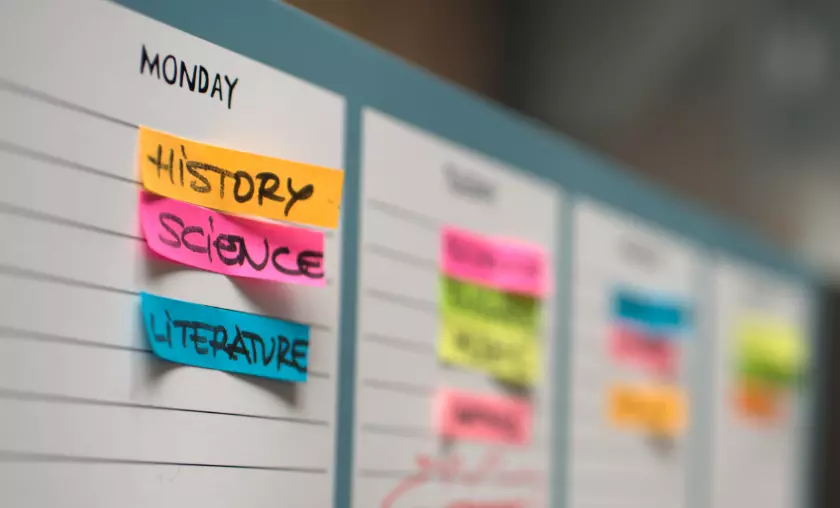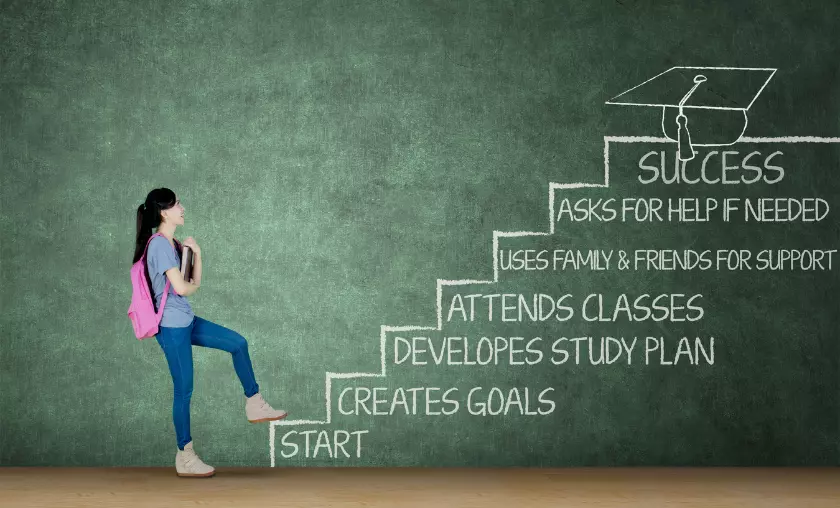
Time management and productivity are crucial skills for college students. With a busy schedule filled with classes, assignments, extracurricular activities, and social commitments, effective time management can make or break your college experience. This guide will provide you with strategies and tips to help you maximize your time, stay organized, and achieve your academic and personal goals during your college years.
Whether you’re a freshman just starting your college journey or a seasoned student looking to enhance your time management skills, these principles will empower you to make the most of your college experience.
Time Management & Productivity in College
The Clock is Ticking
Effective time management plays a crucial role in achieving academic success. With the demanding workload and numerous responsibilities that come with pursuing an education, students who can efficiently allocate their time are more likely to excel.
Properly managed time allows students to prioritize tasks, allocate sufficient study periods, and meet deadlines, reducing the stress and anxiety often associated with academic life. Additionally, effective time management fosters discipline and self-control, essential qualities for staying focused and avoiding procrastination, ultimately leading to improved learning outcomes.
Furthermore, mastering time management skills helps students strike a balance between their academic pursuits and personal life. It enables them to allocate time for extracurricular activities, social interactions, and self-care, promoting overall well-being.
Understanding College Workloads
The Demands You’ll Face
In college, you’ll encounter a diverse range of academic demands. The workload can be intense, from lectures and readings to assignments, projects, and exams. Understanding the nature of these demands and how they vary between courses and semesters is key to effective time management.
- Heavy Workloads: College courses often come with a significant volume of readings, assignments, and projects. Keeping up with the workload can be demanding.
- Time Management: Balancing coursework, extracurricular activities, and personal life requires effective time management skills.
- Independent Learning: In college, you’re expected to take more responsibility for your learning. This includes self-directed study and research.
- Critical Thinking: College courses emphasize critical thinking and problem-solving. You’ll be asked to analyze and evaluate information more deeply.
- Effective Communication: Clear and effective communication is crucial in college, whether through written assignments or class presentations.
This knowledge will help you allocate your time wisely and maintain a balanced approach to your studies, ensuring you’re well-prepared for success in the classroom and beyond.
Creating a Weekly Schedule
Your Roadmap to Success
Crafting a weekly schedule is akin to creating a roadmap to success in college. It allows you to allocate time for classes, study sessions, extracurricular activities, and personal commitments. A well-structured schedule helps you maintain a healthy balance between academics and life outside of the classroom. Moreover, it’s a powerful tool for time management, ensuring that you meet deadlines and make the most of your college experience.
Benefits of Structured Time Blocks for Study & Leisure
Whether you prefer digital apps or a traditional planner, your weekly schedule will be your trusted companion throughout your academic journey.
Prioritizing Tasks
Tackling the Most Important First
Prioritizing tasks is a fundamental skill for college success. By tackling the most important tasks first, you ensure that your energy and focus are directed where they matter most. This strategy allows you to complete crucial assignments, meet deadlines, and excel academically. Moreover, it helps you avoid last-minute rushes and the stress associated with unfinished tasks.
- Set Clear Objectives: Start by defining your academic and personal goals. Whether it’s achieving a certain GPA, mastering a new skill, or maintaining a healthy work-life balance, clarity in your objectives is crucial.
- Rank by Importance: Once you’ve identified your goals, rank them by importance. Determine which goals have the most significant impact on your overall college experience and future aspirations.
- Break Down into Milestones: Divide your goals into smaller, manageable milestones. This makes them less overwhelming and more achievable. Each milestone represents a step towards your larger goal.
- Time Management: Allocate dedicated time for working on these goals. Create a schedule that incorporates both academic and personal objectives, ensuring a balanced approach.
- Regular Review: Periodically review your progress. Are you moving closer to your goals? Do you need to adjust your strategies? Regular self-assessment ensures you stay on track and adapt as needed.
By consistently prioritizing, you’ll manage your workload more efficiently and leave room for personal time and relaxation.
Effective Study Techniques
Maximizing Learning
Effective study techniques are essential for college success. These methods go beyond just reading and memorizing; they involve active learning strategies. Some of the most effective techniques include active recall (testing yourself on the material), spaced repetition (reviewing information over time), and summarization (condensing information into your own words).
Key components include finding a quiet and organized study space, staying organized with notes and materials, and seeking help when needed.
Strategies for Efficient & Retention-Oriented Studying
Mastering these techniques can help you retain information better, understand complex concepts, and excel academically.
Utilizing Technology
Tools for Time Management
Leveraging technology is essential for effective time management in college. You can use digital tools like calendar apps, task management software, and note-taking apps to keep track of assignments, deadlines, and important dates.
These tools help you stay organized and allow for easy synchronization across devices, ensuring you’re always up-to-date with your schedule. Additionally, educational apps and online resources can enhance your learning experience, providing quick access to supplementary materials and study aids.
Apps & Software to Enhance Your College Experience
However, it’s crucial to strike a balance and avoid distractions that technology can bring, such as excessive social media use, to make the most of these productivity tools.
Minimizing Distractions
Staying on Course
Minimizing distractions is crucial for staying focused and productive in college. With a multitude of responsibilities and coursework, it’s easy to get sidetracked. Creating a designated study space, silencing your phone or using apps that block distracting websites, and setting specific study hours can help you maintain concentration.
Additionally, adopting time management techniques like the Pomodoro method, which breaks study time into intervals with short breaks in between, can enhance your productivity while allowing for necessary breaks.
Techniques to Maintain Concentration During Study Sessions
By proactively managing distractions, you can make the most of your study time and excel academically in college.
Setting Realistic Goals
Balancing Academics & Life
Setting realistic goals is crucial for college students to strike a balance between academics and personal life. College can be demanding, and it’s easy to become overwhelmed without clear objectives. Start by breaking down your long-term goals into smaller, achievable steps.
Prioritize tasks, allocate time wisely, and be flexible in your planning to accommodate unexpected challenges. Realistic goal-setting allows you to make the most of your college experience, ensuring academic success while leaving room for social activities and personal growth.
- Break Down Big Goals: Ambitious goals can be intimidating, so break them into smaller, manageable steps. This makes the journey less overwhelming and keeps you motivated with each milestone you achieve.
- Time Management: Efficiently allocate your time to accommodate both academic pursuits and self-care. Use time management techniques like the Pomodoro Technique or time blocking to enhance productivity without burnout.
- Prioritize Self-Care: Don’t neglect your physical and mental health. Regular exercise, a balanced diet, and sufficient sleep are vital. Additionally, mindfulness practices like meditation or yoga can help reduce stress.
- Seek Support: Don’t hesitate to reach out for help when needed. College often offers resources like counseling services, study groups, and academic advisors who can assist you in managing your workload.
- Adaptability: Be flexible and open to adjustments. Unexpected challenges will arise, but your ability to adapt and stay resilient will ultimately help you maintain well-being while pursuing ambitious goals.
It’s a valuable skill that fosters time management, reduces stress, and enhances your overall college journey.
Time for Self-Care
Mental & Physical Health
Balancing the demands of college life can be challenging, but allocating time for self-care is crucial for both mental and physical well-being. Taking regular breaks, practicing relaxation techniques, and staying physically active can help reduce stress and enhance your overall health.
Importance of Self-Care and Its Impact on Productivity
Remember that a healthy mind and body are fundamental to academic success and personal fulfillment, so don’t overlook the importance of self-care in your college journey.
Adaptability & Resilience
Navigating College Challenges
In college, adaptability and resilience are invaluable skills. You’ll encounter a variety of academic and personal challenges, from demanding coursework to adjusting to a new environment. Being adaptable means embracing change, adjusting your study strategies when needed, and effectively managing your time.
Resilience, on the other hand, helps you bounce back from setbacks, whether it’s a disappointing grade or personal difficulties.
- Set Realistic Expectations: Adjusting your expectations and workload to match your current circumstances is crucial during challenging times. Setting realistic goals can help prevent burnout and maintain productivity.
- Time Blocking: Continue using time management techniques like time blocking to allocate specific periods for studying and self-care. This structured approach ensures you allocate time for both productivity and relaxation.
- Seek Support: Don’t hesitate to seek support from professors, academic advisors, or counseling services if you’re facing personal or academic challenges. They can provide guidance and resources to help you manage your workload effectively.
- Flexibility: Embrace flexibility in your schedule. Sometimes, unexpected issues arise, and being adaptable allows you to rearrange your tasks to accommodate these challenges.
- Self-Care Priority: In times of adversity, self-care becomes even more critical. Ensure you prioritize sleep, exercise, nutrition, and relaxation techniques like meditation or mindfulness to maintain your physical and mental well-being, which in turn supports your productivity.
These qualities will help you succeed academically and prepare you for life’s ever-changing demands beyond college.
Conclusion
In conclusion, this comprehensive guide to time management and productivity in college has illuminated the path to academic success and personal growth. Time management skills are crucial for meeting academic requirements and maintaining a healthy work-life balance.
Remember that mastering time management is an ongoing journey that requires practice and adaptability. By implementing the techniques and principles outlined here, students can confidently navigate their college years, achieve their goals, and develop skills that will serve them well throughout their lives.
Whether it’s conquering deadlines, excelling in exams, or finding time for personal pursuits, effective time management can unlock the doors to academic excellence and a fulfilling college experience.
FAQ’s
How Can I Maintain a Work-life Balance in College?
Maintaining a work-life balance in college involves setting boundaries, prioritizing self-care, and making time for relaxation, hobbies, and social connections. It’s important to recognize that a balanced life contributes to overall well-being and academic success.
What Should I Do if I Feel Overwhelmed With My Workload?
If you feel overwhelmed, seek support from academic advisors, professors, or counselors. They can provide guidance on time management strategies, study techniques, and resources available on campus to help you manage your workload more effectively.
Are There Tools or Apps That Can Help With Time Management?
Yes, numerous tools and apps can assist with time management and productivity. Popular options include task management apps like Todoist and project management tools like Trello. Calendar apps and note-taking apps can also be helpful for organization.
How Can I Balance Academics and Extracurricular Activities?
Balancing academics and extracurricular activities requires effective time management. Prioritize your commitments, create a weekly schedule, and allocate sufficient time for both academic studies and extracurricular pursuits. Learning to say no when necessary is also important.
What Are Some Strategies to Overcome Procrastination?
Overcoming procrastination involves breaking tasks into smaller, manageable steps, setting deadlines, eliminating distractions, and using techniques like the Pomodoro method. It’s essential to maintain self-discipline and hold yourself accountable.
To Read More Similar Articles, Click Here.
Thanks for Visiting Our Website. If You Appreciate Our Work, Kindly Show Us Some Support in Our Comments Section 🙂





